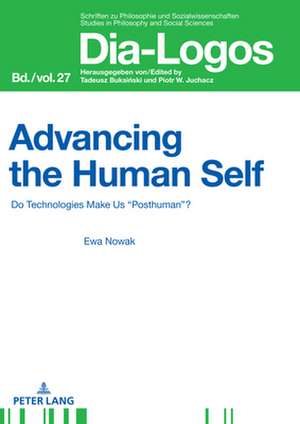Advancing the Human Self: Dia-Logos
Autor Ewa Nowaken Limba Engleză Hardback – 29 iun 2020
Din seria Dia-Logos
-
 Preț: 368.60 lei
Preț: 368.60 lei -
 Preț: 517.53 lei
Preț: 517.53 lei - 23%
 Preț: 451.25 lei
Preț: 451.25 lei - 23%
 Preț: 456.40 lei
Preț: 456.40 lei -
 Preț: 464.05 lei
Preț: 464.05 lei -
 Preț: 456.48 lei
Preț: 456.48 lei -
 Preț: 463.08 lei
Preț: 463.08 lei - 8%
 Preț: 541.14 lei
Preț: 541.14 lei - 23%
 Preț: 484.10 lei
Preț: 484.10 lei - 23%
 Preț: 600.67 lei
Preț: 600.67 lei - 23%
 Preț: 516.59 lei
Preț: 516.59 lei - 23%
 Preț: 570.57 lei
Preț: 570.57 lei - 23%
 Preț: 467.47 lei
Preț: 467.47 lei - 23%
 Preț: 553.67 lei
Preț: 553.67 lei - 23%
 Preț: 463.33 lei
Preț: 463.33 lei - 20%
 Preț: 459.14 lei
Preț: 459.14 lei - 20%
 Preț: 466.88 lei
Preț: 466.88 lei
Preț: 422.63 lei
Nou
Puncte Express: 634
Preț estimativ în valută:
80.87€ • 86.48$ • 67.43£
80.87€ • 86.48$ • 67.43£
Carte tipărită la comandă
Livrare economică 18 aprilie-02 mai
Preluare comenzi: 021 569.72.76
Specificații
ISBN-13: 9783631806784
ISBN-10: 3631806787
Pagini: 148
Dimensiuni: 148 x 210 x 25 mm
Greutate: 0.47 kg
Editura: Peter Lang Copyright AG
Seria Dia-Logos
ISBN-10: 3631806787
Pagini: 148
Dimensiuni: 148 x 210 x 25 mm
Greutate: 0.47 kg
Editura: Peter Lang Copyright AG
Seria Dia-Logos
Notă biografică
Ewa Nowak is a full professor and chair of ethics at AMU Poznañ (Poland); a former visiting scholar of Cornell Univ. and Universities of Konstanz, Bern, Berlin and Siegen; the co-author of Ethos in Public Life (2008) and Experimental Ethics (2013); and the co-editor of Kohlberg Revisited (2015) and Educating Competencies for Democracy (2013).
Cuprins
technopoiesis - self-identity - narrative identity - episodic self - embodied self - organism - crosscorporeality - assemblage - body representations - plasticity - bionics - transplant - disability - Jonas - Gehlen - Merleau-Ponty - Gallagher - Shildrick - Ricoeur - Waldenfels - Gadamer - Dabrowski - Kepinski - chronic patient vs. agent - autotherapy - psychosurgery - artificial intelligence - posthumanism
Descriere
Do technologies advance our self-identities, as they do our bodies or cognitive skills? Are doomed to disintegration and an episodic self? This book examines how technologies affect our selves from the perspective of health humanities (e.g., transplantology, bionics, disability studies), phenomenology, philosophy of mind and posthumanism
